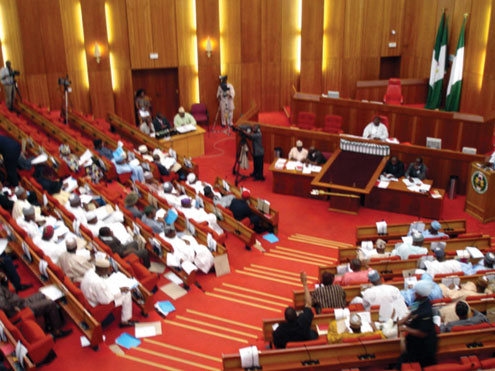News
Mavi Mudiaga: Excessive Pay for Legislators is Justified
 The fact that Nigerian legislators (senators, members of the House of Representatives and State Houses of Assembly) earn ridiculous salaries is not breaking news- we are aware, we have complained, we have protested (within the walls of our homes) and have debated about it. The only avenue we have not yet explored is writing a petition.
The fact that Nigerian legislators (senators, members of the House of Representatives and State Houses of Assembly) earn ridiculous salaries is not breaking news- we are aware, we have complained, we have protested (within the walls of our homes) and have debated about it. The only avenue we have not yet explored is writing a petition.
Recently, I came across a media report on how much Nigerian legislators (Senators and members of the House of Representatives, to be precise) earn. In order not to publish figures that might be exaggerated or incorrect, I would confidently say they earn close to “nine figures” on an annual basis. I would not delve into comparison with what legislators in other jurisdictions earn. For our purposes, it is sufficient to state the obvious- their salaries are ridiculous- and their performance is not commensurate with their remuneration.
When I say “performance”, I do not mean building classroom blocks, drilling boreholes, construction of roads, refurbishment of markets, etc. That is not what they are elected by the electorate to do (for our purposes, we would assume that elections in Nigeria are not marred with irregularities and the votes of the electorate count). The performance expected from our legislators is to LEGISLATE i.e. pass good and meaningful laws and repeal those that are unnecessary or not suitable for a modern democracy. Infrastructural development is the work of the executive arm of government but if the legislators feel the urge to engage in such development, that should be an added bonus- it should not be the basis of their performance score card. Besides, they get allowances for constituency development.
Ever wondered the justification for their excessive pay? Apparently, it is not because they need different official cars or to pay for their accommodation or estacode or holidays or truck-load of policemen. The Chairman, House of Representatives Committee on Electoral Matters, Hon. Jerry Manwe (PDP/Taraba) (in a Thisday Report published on 6 August 2013), while responding on the recent report on legislators’ remuneration mentioned above, gave a justification for their excessive pay.
According to Hon. Jerry Manwe, it is because a legislator spends about N100 Million to execute election campaigns to secure a seat at the National Assembly. In his words:
“A parliamentarian in Nigeria is the most exposed person to the electorate. He is the one that the electorate see and he is the one that they go to when they have problems…
“Whatever a legislator earns, 80 per cent of it goes to his people. Whatever I receive is not mine alone because our culture is different and we are bound to be our brothers’ keeper…
“An average legislator spends not less than N100 Million to contest an election and win. I don’t blame the Nigerian public for demanding money from their legislators. They do that because they lack the resources to take care of their basic needs. If the system works well, the queue at the legislator’s house would be reduced and maybe then the Nigerian Legislators might begin to earn like their counterparts in Europe and America.”
From his statement, he clearly does not dispute the fact that legislators earn excessively. Is Hon. Manwe, therefore trying to say that legislators earn in excess in order to “recoup” election costs? Is it our fault that contesting elections is an expensive exercise? No-one ever said it is not capital intensive- ask their European and American “counterparts” how they raise funds for elections and whether they hope to get recouped from the tax-payers’ money. Or is he insinuating that the poor people (their constituents) who depend on their “representatives” for financial assistance are to blame for their excessive remuneration?
I do not suggest that financial assistance should not be given to a legislator’s constituents; I’m of the view that the government has a duty to take long-lasting steps in order to help the situation of their people. The fact that a legislator is charitable (which is highly recommended) should be from his/her own pocket; his/her charity should not be funded by public funds.
To top it all, according to the report, he concluded by saying that “for the present system in Nigeria to change, the citizenry requires a complete re-orientation that would make voters not to demand money from persons seeking election into political offices… Until the country attains a level of development where politicians are not compelled to part with money during elections and parliamentarians were elected based on their qualities and ability to represent their people, jumbo salary would remain a necessity in Nigeria.”
So, dear Bellanaijarians, apparently, Nigerians need re-orientation, and politicians are “compelled” to give money during elections (from all indications, it is the poor constituent that “compels” charity) and unless these stop, it would remain necessary for legislators to receive excessive remuneration.
This is the justification for legislators’ excessive pay.
It would be interesting to see what his fellow legislators have to say about this justification. If they do not comment, it is safe (and I give you the permission) to conclude that he speaks for all legislators on this matter.
What’s your take?
______________________________________________________________________________________
Mavi Mudiaga is a Nigerian Legal practitioner, writer and recipient of several academic scholarships and awards. She holds a First Class LLB(Hons) from the University of Buckingham, and is presently an LLM student at the London School of Economics. She’s committed to the (re)education of people on trending legal issues. Her website is mavisblawg.com.

























